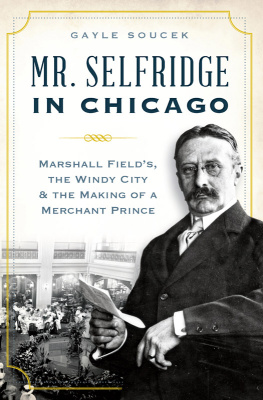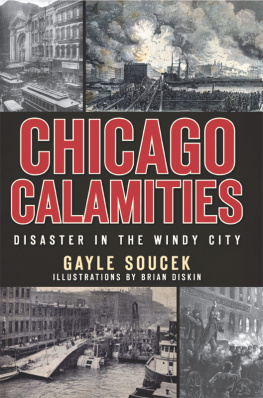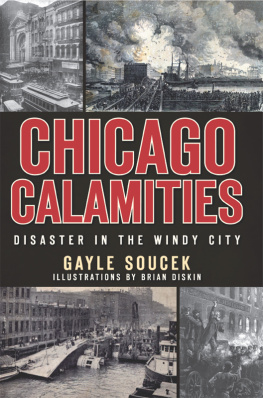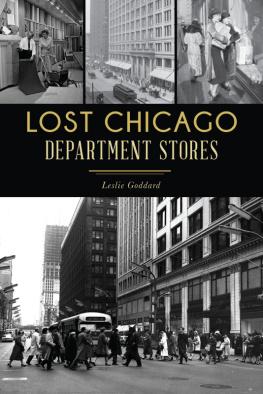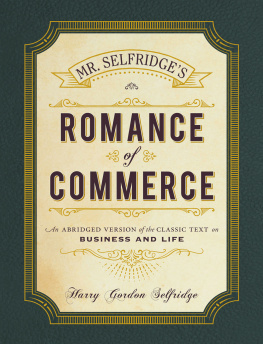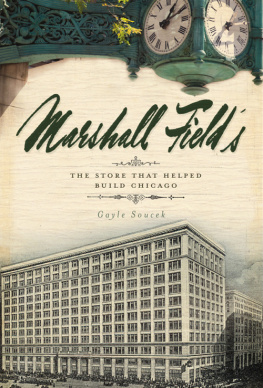


Published by The History Press
Charleston, SC
www.historypress.net
Copyright 2015 by Gayle Soucek
All rights reserved
All images from authors collection unless otherwise noted.
First published 2015
e-book edition 2015
ISBN 978.1.62585.265.6
Library of Congress Control Number: 2015937994
print edition ISBN 978.1.62619.736.7
Notice: The information in this book is true and complete to the best of our knowledge. It is offered without guarantee on the part of the author or The History Press. The author and The History Press disclaim all liability in connection with the use of this book.
All rights reserved. No part of this book may be reproduced or transmitted in any form whatsoever without prior written permission from the publisher except in the case of brief quotations embodied in critical articles and reviews.
CONTENTS
INTRODUCTION
Nothing in the world is done as well as it can be done.
Harry Gordon Selfridge
History is always a bit of a puzzle. Faded dates inscribed in yellowed ledgers, names spelled incorrectly in elaborate and hard-to-decipher script, carefully recorded but distorted memories of survivorsno amount of research can ever claim to portray events of the distant past with 100 percent accuracy. The best that an author can do is to review multiple sources of information and attempt to glean that tiny common thread that most likely hints at the real truth. You might find that some small bits of information in this book conflict with other sources, but rest assured that each conclusion drawn was the result of lengthy investigation and careful study.
Harry Gordon Selfridge presents an extraordinary enigmathe poor Wisconsin lad who honed his trade among Chicagos (indeed, the worlds) most celebrated merchants before he headed off to take London by storm. Much of his early and rather unremarkable life went unrecorded, only to be reinvented and colorized at Harrys whims. He would brazenly shave years off his age to the extent that even his wife and children were uncertain of his true birth date. Some tales he told were true, others were embellished and some were blatant pants-on-fire fabrications. In fact, it sometimes seems that there were two Harrys: the talented and hardworking merchant whose story was reported in Chicago and the regal British Harry, whose exaggerated recollections of his earlier years often differ sharply from past chronicles.
Perhaps he felt the need to dramatize his circumstances because to Harry, good was never good enough. Everything in his world needed to be spectacular, larger than life. In many ways, this trait served him well. Because he aimed so high, he achieved more than most of his peers. However, this pursuit of excesses also proved to be his downfall. One thing can be said for certain: Harry Gordon Selfridge was a man who lived to his fullest capacity and changed the lives of those who surrounded him in the process. He was a showman, a magician and, perhaps, in the end, just a hungry boy who wanted to make his mother proud.
THE HUMBLE BEGINNINGS
It is not the making of money that is the chief motive with me. It is the great game that is the thing.
Harry Gordon Selfridge
Ripon, Wisconsin, is a small midwestern town that has birthed some very big ideas. Situated on the gentle rolling hills and meadows of the upper Fox River basin in Wisconsinabout eighty-five miles northwest of Milwaukeethe land once belonged to the American Indian tribes that fished its streams and hunted its woodlands. The Winnebagos, the Illinois, the Kickapoos, the Foxes, the Miamis and the gentle Mascoutins all lived in relative harmony. In fact, long before the white man arrived, there existed a massive Mascoutin village located just northwest of Ripon that housed more than twenty thousand individuals from five different tribes. They had come together to live in peace and in common defense against attacks by the warlike Iroquois, but as it turned out, the Iroquois were the least of their problems. French explorers convinced the Mascoutin people to resettle near the French fort at Detroit, where the peaceful tribe was systematically exterminated by the white conquerors and their Indian allies. By the mid-1800s, the remaining Fox Valley tribes were being forced from their lands under the Indian Removal Act of 1830 in order to make way for the European pioneers who were fast arriving to start a new life in the American frontier.
The first white men to settle permanently in the area arrived in May 1844. Nineteen men and one boy traveled from the town of Southportnow Kenoshato break ground for a grand social experiment. Known as the Wisconsin Phalanx, this group dreamed of creating an agricultural commune based on the teachings of French philosopher and socialist Charles Fourier. They named the community Ceresco in honor of Ceres, the Roman goddess of agriculture, and at its peak, about two hundred residents lived and worked cooperatively to farm its two thousand acres. Unlike some other utopian communitarian societies of the day, Ceresco carried little debt, and its assets exceeded its liabilities. Unfortunately, its financial success did little to quell the discontent of members who were growing tired of the cramped shared quarters and loss of autonomy. Slowly, the membership began to decline, and by 1849, it had become clear that the experiment was reaching an inevitable end. Over the next few years, the association sold off all of its land and other assets, and the money was divided equally among its shareholding members.
As the Ceresco commune began to liquidate, David Mapes, a steamboat captain from New York, arrived in search of land. Mapes had recently suffered the loss of his shipand his livelihood as wellwhen the uninsured vessel sank after a collision. He took the meager salvage money and headed west without a firm plan in mind. Mapes recorded his adventures and explained why he came to Wisconsin: I took another start in life and tried to acquire property which would not sink when having a hole stove in it. When he reached the Fox Valley, he was immediately dazzled by the beauty of the area. Here for the first time in my life I saw a prairiethat prairie was the loveliest sight I had ever seen in nature, and through the summer with its monthly change of flowers, there was nothing more enchanting. Without hesitation, he returned to New York, packed up his family and belongings and headed back to the Wisconsin frontier to build a new home.
After a brief stint at farming, Mapes dreamed of building a city on the land, which he referred to as a spot which was, in its state of nature, the fitting center of that Garden of Eden. At the time, most of the land adjacent to Ceresco was owned by Governor John Scott Horner. Horner agreed to sell the property, but with a few conditions. Among them, Mapes would have to build a gristmill and a public house, live in the town for at least one year and allow Horner to name the new city. Mapes agreed, and Ripon was born. It took its name from the picturesque ancient British cathedral city located on the River Ure in North Yorkshire, which was Horners ancestral home. The town grew quickly and soon boasted a gristmill, a post office, a hotel, a blacksmith shop, a school and several stores. Finally, in 1853, Ceresco and Ripon were formally merged by the Wisconsin legislature. Although the lawmakers named the new town Morena, the name never stuck, and it was eventually incorporated as the city of Ripon.
Next page
